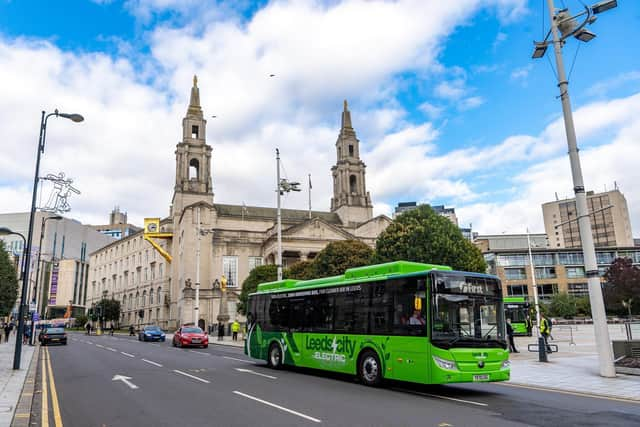'Oyster card' and new phone app proposed for Leeds as council reveals major transport plans
and live on Freeview channel 276
A document published by council officers this week outlines plans for the next decade aimed at getting more people to use public transport, and to turn Leeds into a city where “nobody needs a car”.
Bringing bus services in West Yorkshire back into public control had been a major campaign promise of new regional mayor Tracy Brabin, and speaking at a press briefing this week, Leeds City Council head James Lewis claimed such a move could lead to a revolution in ticketing for people in the district.
Advertisement
Hide AdAdvertisement
Hide AdHe said: “I would hope the Treasury would refocus their investment on public transport infrastructure – not just on relieving congestion at peak times, but on delivering a network where people do use a train throughout the week.


“There is an established model of transport investing which is based around ‘how do you move people around between 6am and 9am on a weekday morning?’ – that has changed because of the pandemic.
“If we want to meet our carbon objectives, we have to have better public transport. People are travelling at different times and for different reasons.
“We think the bus service in Leeds could be a lot better than it is – we are putting work on the ground to achieve that.
Advertisement
Hide AdAdvertisement
Hide Ad“If people have a simple Oyster-style ticket for West Yorkshire where they can hop on and off and know what the total cost will be, rather than having to have a lot of expert knowledge in terms of what tickets to buy.
“On my phone I have four different apps for different tickets in West Yorkshire – if we could get that all onto one app and people know that it will be good value for money – that will be part of it.
“It’s not a quick process, but it’s a challenge we put to the transport companies.”
The Oyster Card is a service set up by Transport for London, which allows passengers to use the same pre-paid card to travel on any part of the city’s public transport network.
Advertisement
Hide AdAdvertisement
Hide AdAccording to the latest version of the Connecting Leeds strategy, the council wants the city’s roads to contribute a reduction of “up to 43 per cent” in CO2 emissions by 2030, a 30 per cent reduction in car mileage and a 130 per cent increase in bus usage.
Among plans cited to help with this are driverless vehicles, charging employers for providing parking spaces to colleagues, and introducing a charging zone for high-polluting vehicles.
It also includes an aim to get funding to finally create a mass transit system for the city.
The paper has recently gone out to public consultation. A Leeds City Council officer added: “The majority of people liked the outline vision, but they wanted to know what we were going to do.
Advertisement
Hide AdAdvertisement
Hide Ad“To plan that out over a 10 year period, with the uncertainties around funding, isn’t really easy to do. So we are also going to publish an action plan for three years. After that we can re-evaluate that action plan to get us up to 2030.
“The targets we have set in terms of climate emergency are really challenging. Transport contributes to more than a third of emissions, so it is really difficult to do – particularly as West Yorkshire’s targets are for 2038 and national targets are for 2050.